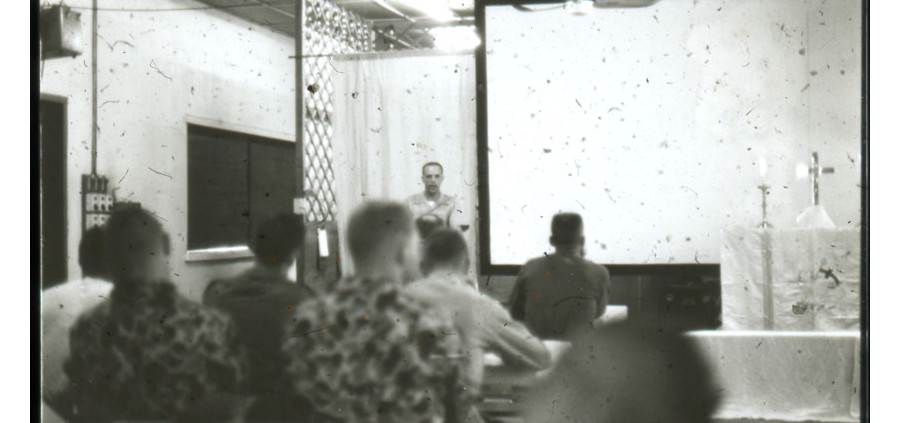Power Differentials by Nicole d’Entremont

Absolution
By Alice McDermott
Farrar, Straus and Grioux, 2023
$28 324 pp.
Does the word absolution still mean anything in today’s world, or has it been consigned to the dustbin of history, like shriving and atonement? Aren’t these words predicated on some outmoded concept of sin, the snake, the apple, the banished garden? Yet in Alice McDermott’s new novel, Absolution, the concept becomes an elusive question begging an answer. The setting is the shifting circumstances and complexities of America’s involvement in the war in Vietnam.
A caveat to readers up front: This will not be a book review in the traditional sense. I am not going to probe McDermott’s writing style, which is unparalleled in its ability to draw you in—no, more like grab you by the throat so you can’t escape with language both descriptive and conversational. This review will attempt to engage in conversation with and about the individual characters in the book. I recognize them. We shared a time. We shared the election of our young Catholic president, John Fitzgerald Kennedy. We shared the image of Thich Quang Duc, the Buddhist monk, burning himself on a Saigon street. We shared the experience of Pope John XXIII throwing open the windows of the Vatican only to have them slam shut again. And throughout it all, we shared the Vietnam War.
What was not shared by all of us is what McDermott describes in the novel’s opening lines:
There were so many cocktail parties in those days. And when they were held in the afternoon we called them garden parties, but they were cocktail parties nonetheless.
You have no idea what it was like. For us. The women, I mean. The wives.
These wives are the women who accompanied their husbands to Saigon in the buildup to our open involvement in the war. Tricia, the woman commenting above, is responding to a letter received out of the blue from the daughter of a woman she once knew in Saigon when they all lived there in 1963. The letter asks three questions: Do you remember my mother? Do you remember me? Do you remember Dom? The novel spools out from these three questions, opening the door to Saigon. We can feel the heat and hear the noise and clash and chaos between the city’s street life and the cosseted world of the American “consultants” housed in their elegant French colonial residences.
Through Tricia’s response we meet two families: Tricia and her husband, Peter, and Charlene and her husband, Kent, and young daughter, Rainey. We follow these characters through their single year in Saigon. It is the year of the doomed regime of Ngô Dinh Diêm, the Catholic president of South Vietnam, who is to undergo a CIA-backed coup, and the year when Ho Chi Minh and his sympathizers are getting their forces organized. Already 11,000 US military advisors are in South Vietnam. Did we, the American public, know this? No. Do Tricia and Charlene, wives of the men they accompanied to Vietnam, know this? No. It is not their role to know, nor was it ours, either.
Tricia and Charlene are to be “helpmeets”—a word used to define a classic, wifely role. Such a role demands that the wife help her husband advance professionally in all ways. Deportment and dress and a good impression are necessary. Here is Tricia recalling getting dressed for a “garden party”:
We were careful to secure the garter just so. Too close to the nylon risked a run. You cannot imagine the troubles suggested in those days by a stocking with a run: the woman was drunk, careless, unhappy, indifferent (to her husband’s career, even to his affections), ready to go home.
One only has to look at old copies of Life magazine to see “helpmeet” images of contentment as women, coifed and lipsticked, pirouette in heels while stuffing roasts into majestic refrigerators while gushing about its new ice-cube manufacturing feature. Not that the world of Saigon in 1963 had such features. Here, wives of husbands working for the United States were provided servants for their homes and American schools for their offspring. But this was also a world where some women did not fit the “helpmeet” role contentedly.
We encounter one in Charlene, the woman whose daughter has written the letter of inquiry that introduces the novel. Charlene is a woman who needs a mission, and others are dragged into her net to fulfill it. I was immediately suspicious of her pushy, WASP-ish energy, full of chirpy words betraying a questionable undertow:
Charlene was young and freckled, with thick strawberry blond hair that she wore pushed back with a small headband. Her nose was pert, her darting eyes, a deep hazel. There was something both regal and feral about the way the straight line of her scalp met her tanned forehead. I recognized her type from my days at Marymount: she had the healthy, athletic, genetic—as I thought of it—confidence of one born to wealth. The first thing she asked me, in fact, was if I played tennis; she was looking for a partner. I did not.
I recognized the type, and I too wanted to hold Charlene at arms’ length. Yet she discovers a susceptible and naive sidekick in Tricia, who reports: “It was another inborn talent of these privileged girls: they were irresistible, much as you hated them.”
The well-intentioned scheme that Charlene introduces involves the selling of Barbie dolls (yes, dear reader, Barbie dolls), then all the rage in the US, but now, here in Vietnam, outfitted with beautiful silken dresses, or ao dais, handmade by local women. The dolls are sold to Americans in Saigon to be posted back home to family and friends as souvenirs. The money gained from these transactions (some black-market financial activity is involved here) is to be used to purchase items for patients and staff at a local children’s hospital.
Absolution explores Tricia and Charlene’s developing relationship, both between themselves and with the Vietnamese women who work in their houses. There are moments of confusion, deference, sadness, and surprising comfort. It is one of McDermott’s gifts as a novelist that she can reveal through a small gesture or tone of voice how the socially enforced power differentials imposed by class and ethnicity can fray over time. Such moments, in her rendering, are never phony or cloying.
Every character in the book counts, no matter how minor. Two of the most memorable are Stella, a college friend from Tricia’s Marymount days, and Marilee, the military wife of a major stationed in Saigon. Stella reminded me of the girls I knew in my Catholic college in Buffalo—smart, opinionated, argumentative, feisty, and fragile. We learn that she once tried to bring Tricia along to Birmingham, Alabama, to participate in the Freedom Riders’ civil rights protests. Marilee is a formidable career officer’s wife who runs the officers’ club. They each represent a specific worldview or psychological perception informing America’s role in Vietnam.
As is characteristic of McDermott’s work, a healthy strain of Catholicism runs through Absolution. Members of the Catholic Worker movement will enjoy (with a few exceptions) a brief cameo from Dorothy Day as well as irreverent characterizations of some nameless but imagined Catholic Worker volunteers. Elsewhere, we learn that Peter, Tricia’s husband, had been dedicated at his baptism to the Blessed Mother and had even been made to wear a Blessed Mother diaper pin. Now in his maturity, he remains an ardent Catholic and wears a Virgin Mary Miraculous Medal around his neck. We also learn that Catholic young men during the 1950s and ’60s were heavily recruited by the CIA: it stands to reason that Catholics were ripe for the picking, since the perils of communism were taught fervently in Catholic schools. In CIA circles, the organization was even jokingly referred to as the “Catholic Intelligence Agency.” I knew nothing about this in 1963. I was in my last year of college; I was already against the war and going down to the Catholic Worker house in New York City regularly. By 1965, I was there full time. But historically and politically, I was about as naive concerning the situation in Vietnam as Tricia was in Saigon.
In recent years, I have made three trips to Vietnam and spent time both in Saigon and the Mekong Delta. All three trips involved projects with Habitat for Humanity, and we always had one or two volunteers who were either returning US soldiers from the war or war resisters who protested it. Because of my time in Vietnam, I was predisposed to be critical of McDermott’s novel. I wondered how she could put readers emotionally and physically into the landscape, how she could express the mix of casual orders, cultural assumptions, oversights, deference, awkwardness, intimacy, caution, wariness, and humor between the Vietnamese women “servants” and the North American families for whom they worked. But she got it right, on both accounts: the steamy heat, the clothing, the gestures, the crush on Saigon boulevards, the pas des deux between Vietnamese counterparts and American “advisor families.” The interactions were believable to me as someone who has experienced them, and observed others experiencing them, in contemporary Vietnam.
Sometimes, though, I felt that McDermott loves her characters a bit too much, so that it is hard for her to say goodbye. For this reason, the ending of Absolution becomes attenuated and loses some energy—though this may just be my own proclivities. I’ve always been uncomfortable with long goodbyes, leaning on the side of a car for the last few words, goodbye and yet again goodbye. Still, this attenuation did not stop me from reading Absolution again, right away, for the sheer richness of the language and the story. That admitted, I can even see myself going for a third turn of the page.
Why? I like that McDermott looks unblinkingly at evil, both the private and public suffering that ensues: the private suffering of a miscarriage, the collective suffering of a war, the mental suffering of conflicting moral choices. She does all of this stunningly.
And some of these characters are pretty difficult and deserve multiple readings to grapple with. What do you do with a character like Charlene? How do you relate to her, so pushy and a consummate liar to boot? And these themes, these uncomfortable questions and actions that McDermott shoves in our faces and demands we look at . . . Why? Who cares about evil anymore, or sin, or confession, or atonement, or, ultimately, absolution? And who can give that absolution anyway? Who’s going to do that job? For a novel so steeped in Catholic culture, there is not one priest who appears.
I think it’s up to you, dear reader. And it’s up to me. The priests aren’t in this book. ♦
Nicole d’Entremont lives on Peaks Island, Maine. Her third novel, Sketching with Renoir, was released in 2023 by Indie Author Books.





Leave a Reply
Want to join the discussion?Feel free to contribute!